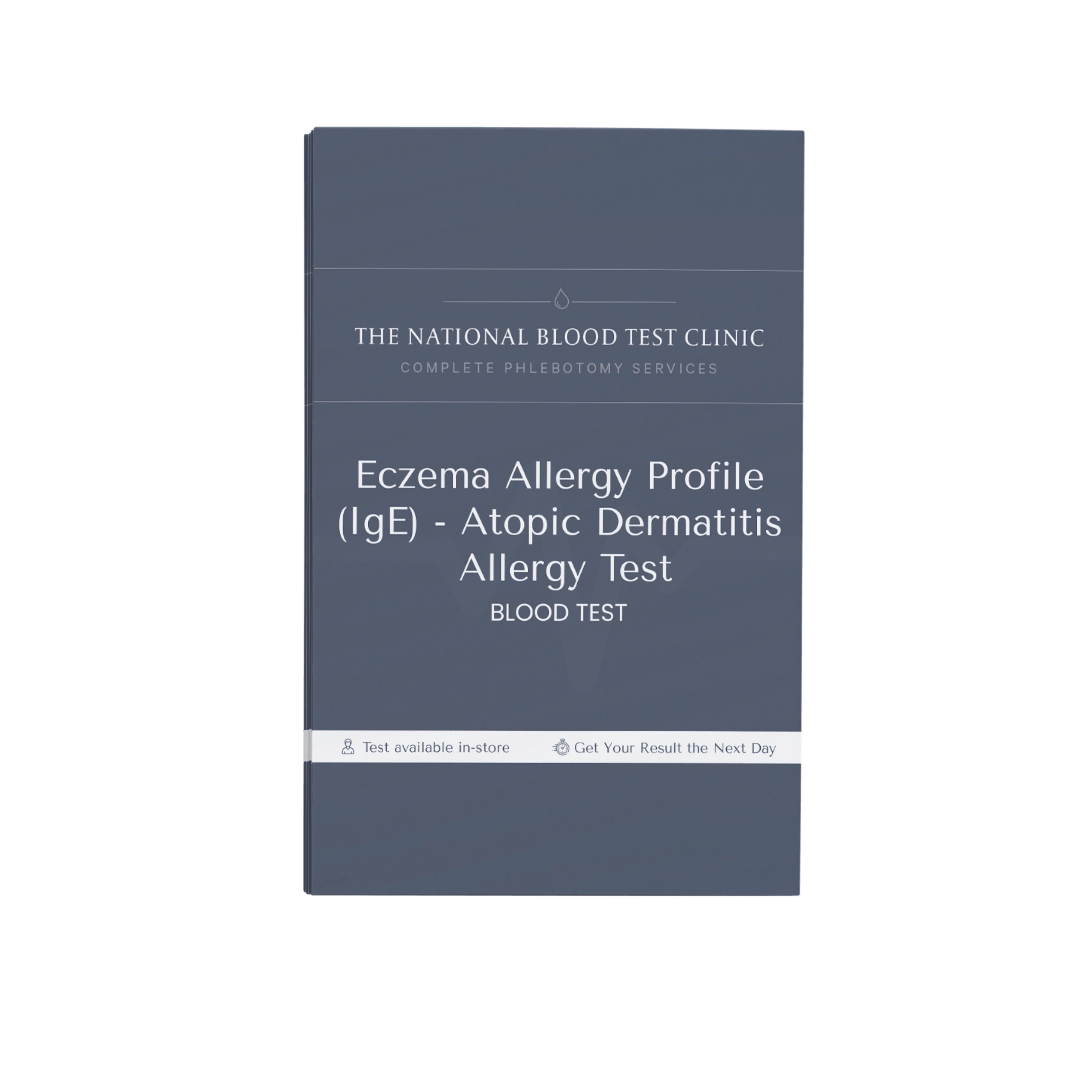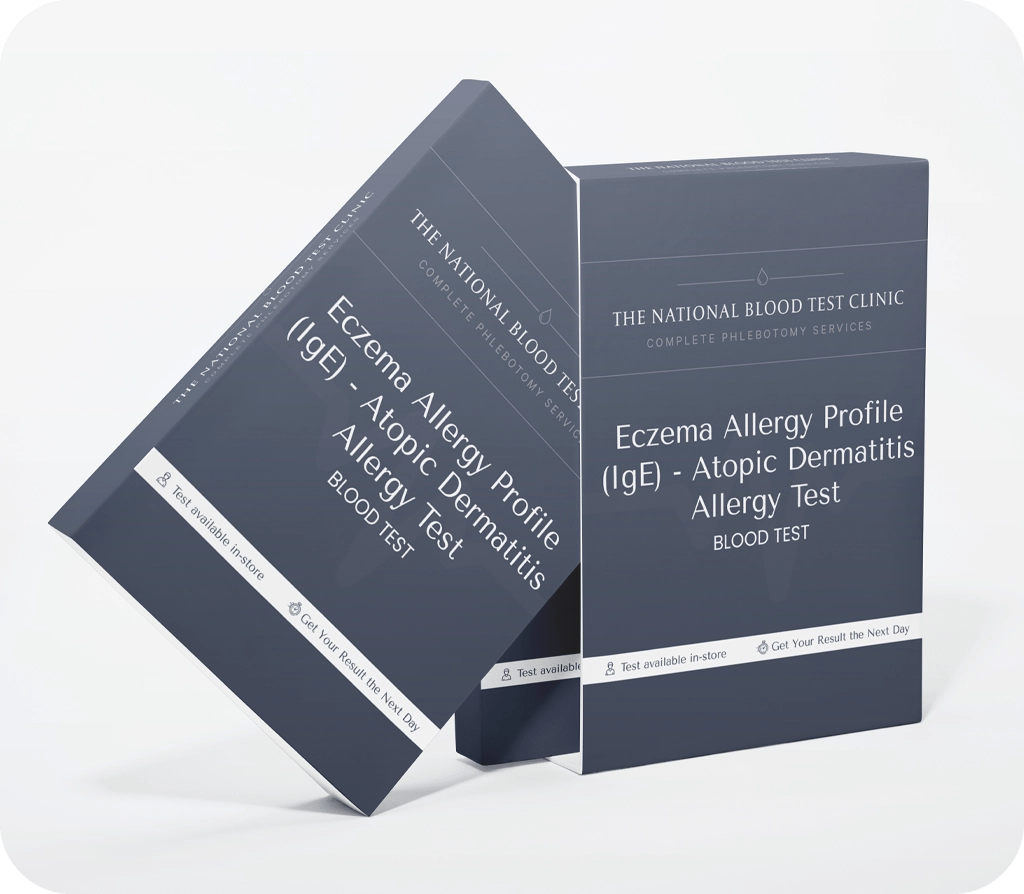My Store
Eczema Allergy Profile (IgE) - Atopic Dermatitis Allergy Test
Eczema Allergy Profile (IgE) - Atopic Dermatitis Allergy Test
SKU:ALL9
Persistent itching, redness, dry skin, or flare-ups of eczema are often linked to allergic triggers. The Eczema Allergy Profile (IgE) helps identify both environmental and food allergens that may worsen skin inflammation, providing valuable insights for managing symptoms and reducing flare frequency.
Why Allergy Test for Eczema (IgE) Matters?
Eczema is often aggravated by hidden allergies that fuel immune overreactions in the skin. Detecting these triggers allows for more personalised treatment plans, targeted avoidance, and improved long-term skin health. Early identification through Eczema Allergy Tests helps break the cycle of irritation, leading to better symptom control and quality of life.
What Gets Assessed?
- D. pteronyssinus
- Alternaria alternata
- Cat (skin flakes)
- Cow's milk
- Egg's white
- Wheat
- Fish (cod)
- Hazel nut (Recombi+)
- Peanut
- Soya bean
Turnaround Time
- 7 Days
100 in stock
Visit a partner clinic (+£50)
Once you've ordered your test, look out for an email from our phlebotomy partners containing information and a link to book your appointment. We'll send you everything the clinic will need to complete the sample and post it back to our labs.
Organise a nurse yourself
If none of the above options work for you, you can arrange your own medical professional to collect your sample. There is no additional charge for this. Once you've ordered your test, we'll send you everything you and your chosen medical professional will need to collect a sample and post it back to our labs.
Couldn't load pickup availability
Enter Your Details


Visit a partner clinic (+£50)
Once you've ordered your test, look out for an email from our phlebotomy partners containing information and a link to book your appointment. We'll send you everything the clinic will need to complete the sample and post it back to our labs.
Organise a Nurse Yourself
If none of the above options work for you, you can arrange your own medical professional to collect your sample. There is no additional charge for this. Once you've ordered your test, we'll send you everything you and your chosen medical professional will need to collect a sample and post it back to our labs.
How Our Test Works
-

Place Your Order
Place your order online and receive a test kit delivered to your home. You’ll need to bring this kit with you to your scheduled appointment at one of our partner blood collection clinics.
-

Attend Your Appointment
At your chosen clinic, a trained nurse or phlebotomist will collect your blood sample using the kit you bring. If a sample collection courier is not available at the site, you’ll be asked to take the sealed sample with you and post it using the prepaid packaging provided.
-

Receive Your Results
Once your results are ready, you’ll receive an email notification to log in and view them securely via your private portal. Please note: venous blood test results are not automatically reviewed by a doctor. We recommend booking a consultation with a qualified clinician to help you interpret and understand your results fully.
FAQs
Who should consider this test?
This test is suitable for individuals with chronic skin irritation, eczema flare-ups, or suspected allergic triggers that worsen their skin condition.
How is the test carried out?
A blood sample is taken to measure IgE antibody levels against common allergens known to aggravate eczema symptoms.
What allergens are included?
The profile usually covers food allergens such as cow’s milk, egg, peanut, and environmental allergens like dust mites, pollen, moulds, and pet dander.
What do the results mean?
Results show IgE antibody responses for each allergen, helping to identify which triggers may be causing or worsening eczema.
How can this test help manage eczema?
By identifying specific allergy triggers, the test supports personalised management plans, including dietary changes, allergen avoidance, and targeted treatments to reduce flare-ups.
Subscribe to our emails
Be the first to know about new collections and exclusive offers.





